U5-U7单元重点词汇与句型
5A Unit 7 词汇句型(201512)
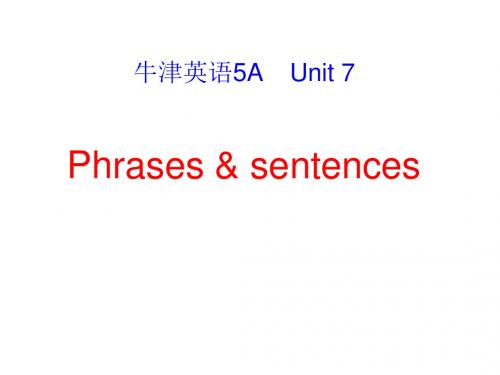
Phrases
at weekends 1.在周末 play with 2.和…一起玩 very much 3. 非常 go to the cinema 4.去看电影 5. 拜访我的祖父母 visit my grandparents 6.和他们的猫一起玩 play with their cat 7.和我们的祖父母一 have dinner with our 起吃晚餐 grandparents
do visit Who ________ you ________ _______usually _________?
5. I usually play football at weekends. (划线提问)
What do __________do you usually________ at weekends?
( B)1. John’s hobby is _________ football. A. play B. plays C. playing D. √ played ( B)2. The girl usually chats __________her parents __________the Internet. A. to; in B. with; on C. with; in D. and; in ( B)3. He’s not . He can’t play basketball __ . A. fast; good B. strong; well C. strong; good D. strong; better ( C)4. Lily usually __________kites in the park ______weekends. A. flys; at B. flies; in C. flies; at D. flys; in ( B)5. –Do you have any sweets? – Yes,___________. A. I have B.I do. C. I am D. I have any
(译林版)5A Unit7 At parties知识点归纳

(译林版)5A Unit7 At parties知识点归纳
本文档是对译林版五年级英语教材第七单元 "At parties" 知识点的归纳和总结,旨在帮助学生更好地理解和掌握该单元的内容。
一、词汇
本单元涉及到的一些重要词汇包括:
1. invite:邀请
2. guest:客人
3. party:派对
4. celebrate:庆祝
5. birthday:生日
6. cake:蛋糕
7. candle:蜡烛
8. present:礼物
9. balloon:气球
10. decorate:装饰
二、句型与表达
本单元研究了一些与派对相关的句型和表达,如:
2. When is your birthday?:你的生日是什么时候?
3. My birthday is on [date]:我的生日是在[date]。
4. Happy birthday!:生日快乐!
5. Here is a present for you:这是给你的礼物。
三、对话及篇章理解
通过阅读本单元对话和篇章,学生可以了解派对的安排和活动,同时提高对英语对话和篇章的理解能力。
四、扩展活动
在研究完本单元的内容后,可以进行以下扩展活动:
1. 与同学一起举办一个模拟派对,实践对话和表达。
2. 设计一个生日贺卡,用英语表达祝福。
3. 和家人朋友一起庆祝生日,运用所学词汇和句型进行交流。
通过以上归纳,学生可以更好地掌握 "At parties" 这一单元的重点内容,并能运用所学知识进行实践和交流。
希望本文档能为学生的学习提供一定的帮助和指导。
七年级上册英语u五知识点总结

七年级上册英语u五知识点总结七年级上册英语U5知识点总结本文将对七年级上册英语U5中涉及到的知识点进行详细总结,以便学生能够更好地掌握这一部分内容。
一、基础单词1. actor 演员;2. scientist 科学家;3. artist 艺术家;4. police officer 警察;5. lawyer 律师;6. engineer 工程师;7. doctor 医生;8. teacher 教师;9. writer 作家;10. pianist 钢琴家以上是本单元重点出现的职业名词,同学们需要熟记这些单词的意思并学会正确的发音。
二、重点短语1. be interested in 对...感兴趣;2. be good at 擅长于...;3. be proud of 对...感到骄傲;4. be different from 与...不同;5. talk about谈论;6. write about 关于...写作;7. listen to 听;8. watch TV 看电视这些短语是课文中出现频率较高的,学生们需要逐一理解掌握。
三、重点语法1. 一般现在时:在谈论爱好、兴趣、常态、事实等方面时使用一般现在时态;2. “be good at”结构:表示某个人在某个领域有很好的表现或能力;3. “be interested in”结构:表示对某个事物或领域有兴趣;4. “be proud of”结构:表示以某人或某事物为荣;5. “like to do”和“like doing”的区别:前者表示喜欢做一个动作,后者表示喜欢某个活动的结果。
以上语法知识是本单元重点,同学们需要重点理解掌握。
四、课后练习1. 单项选择:选择适当的单词、短语或语法结构填空;2. 完形填空:根据整篇文章的意思推测空缺的单词或短语;3. 阅读理解:阅读一篇文章,回答文中提出的问题。
以上课后练习是巩固知识和提高听说读写技能的关键,同学们需要有计划、有方法地进行学习和练习。
九年级英语u5-u7知识点

九年级英语u5-u7知识点Unit 5: Famous PeopleIn the fifth unit of ninth-grade English, students delve into the lives and achievements of some famous people. This unit provides an opportunity for students to explore the impact these individuals have made in different fields. Let's take a look at some of the key knowledge points covered in Unit 5.1. Biographies:Unit 5 begins with the study of biographies, which are accounts of people's lives written by someone else. Students learn how biographies are structured and how to identify the main events and accomplishments of a person's life. They also learn to analyze the traits and characteristics that led to the individual's success.2. Vocabulary:Expanding on the topic of biographies, students learn an array of vocabulary words used to describe personal traits and achievements. These words enable students to express themselves more effectively when talking about famous personalities. Some common vocabularywords in this unit include determined, courageous, innovative, influential, and visionary.3. Reading Comprehension:Throughout this unit, students are exposed to various texts that include biographical accounts. They practice extracting information from these texts, understanding the main ideas, and making inferences based on the information provided. This not only strengthens their reading skills but also enhances their ability to comprehend and analyze biographical texts.4. Listening and Speaking:Unit 5 incorporates listening and speaking activities that focus on famous personalities. Students listen to recordings or watch videos about the lives and achievements of notable individuals, and then engage in discussions and role-plays to express their thoughts and opinions. This helps improve their listening and speaking skills while also fostering critical thinking and communication abilities.Unit 5 provides an excellent opportunity for students to develop their knowledge of famous people and their ability to express ideas and opinions about them. By studying biographies, expanding their vocabulary, and practicing reading comprehension, listening, andspeaking skills, students gain a deeper understanding of the individuals who have left remarkable legacies in various fields.Unit 6: Science and TechnologyMoving on to Unit 6, ninth-grade English students delve into the fascinating world of science and technology. Through this unit, students explore different scientific concepts, technological advancements, and their impact on society. Let's explore the key knowledge points covered in Unit 6.1. Scientific Discoveries:Unit 6 introduces students to various scientific discoveries throughout history and provides insights into the methods and processes used in scientific research. Students learn about notable inventors, scientists, and their breakthroughs, which have revolutionized the world in areas such as medicine, physics, and technology.2. Technological Advancements:This unit expands on the topic of scientific discoveries by exploring how these discoveries have led to technological advancements.Students delve into the fields of robotics, artificial intelligence, space exploration, and communication technology. They learn about the positive and negative impacts of these advancements on individuals, society, and the environment.3. Vocabulary:In Unit 6, students acquire a rich vocabulary related to science and technology. They learn words associated with scientific concepts, research methods, and technological advancements. This vocabulary enables students to express their thoughts and ideas more accurately when discussing scientific topics.4. Writing Skills:Unit 6 provides opportunities for students to develop their writing skills by composing persuasive and informative texts related to science and technology. They learn to structure their writing, provide evidence to support their arguments, and present their ideas in a coherent and logical manner. This enhances their written communication skills and critical thinking abilities.Unit 6 serves as a gateway for students to explore the wonders of science and technology. By studying scientific discoveries, technological advancements, and developing their vocabulary andwriting skills, students gain a deeper appreciation for the impact of science and technology on our lives and society as a whole.Unit 7: Global IssuesIn the final unit of ninth-grade English, students dive into the complex and interconnected world of global issues. This unit encourages students to think critically about the challenges facing our planet and the possible solutions that can be implemented. Let's explore the key knowledge points covered in Unit 7.1. Environmental Issues:Unit 7 explores the various environmental issues that our planet faces today, such as climate change, deforestation, pollution, and the depletion of natural resources. Students examine the causes, impacts, and potential solutions for these issues, while also considering the role individuals can play in making a positive change.2. Social Issues:This unit also delves into important social issues, such as poverty, inequality, education, and human rights. Students learn about the causes and consequences of these issues, as well as the efforts beingmade worldwide to address them. They examine the importance of empathy, compassion, and social justice in creating a more equitable world.3. Debating and Presenting:Unit 7 encourages students to engage in debates and presentations related to global issues. They research, gather evidence, and present their arguments on various topics. Through these activities, students develop their critical thinking, public speaking, and persuasive skills, while also learning to respect different opinions and viewpoints.4. Reflection and Action:The unit concludes by inspiring students to reflect on their role as global citizens and take action to address global issues. Students are encouraged to think about how they can contribute to creating a more sustainable, just, and inclusive world. They explore the importance of individual actions and collective efforts in bringing about positive change.In Unit 7, students are exposed to the harsh realities of the world and encouraged to think critically and act responsibly. By studying environmental and social issues, engaging in debates and presentations, and reflecting on their role as global citizens, students develop a deeperunderstanding of the challenges our world faces and the potential for positive change.。
七年级上册英语u5知识点总结
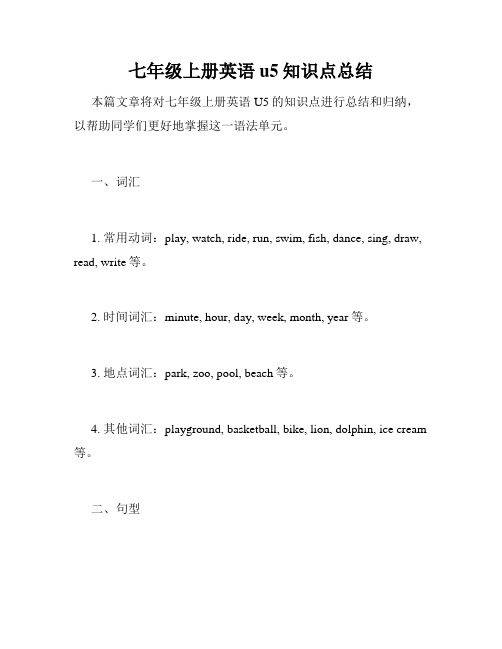
七年级上册英语u5知识点总结本篇文章将对七年级上册英语U5的知识点进行总结和归纳,以帮助同学们更好地掌握这一语法单元。
一、词汇1. 常用动词:play, watch, ride, run, swim, fish, dance, sing, draw, read, write等。
2. 时间词汇:minute, hour, day, week, month, year等。
3. 地点词汇:park, zoo, pool, beach等。
4. 其他词汇:playground, basketball, bike, lion, dolphin, ice cream 等。
二、句型1. 现在进行时的句型:主语+be动词+动词-ing,例如:I am playing basketball. She is swimming in the pool.2. 一般现在时的句型:主语+动词原形,例如:We play basketball every day. He rides his bike to school.3. 一般过去时的句型:主语+动词过去式,例如:I watched TV last night. They went to the park yesterday.4. 特殊疑问句的句型:特殊疑问词+一般现在时/现在进行时/一般过去时+主语+动词原形/动词-ing/动词过去式,例如:What are you doing now? Where did you go yesterday?5. 一般疑问句的句型:be动词/助动词+主语+动词原形/动词-ing/动词过去式,例如:Are you playing basketball? Did you go to the park yesterday?6. 反意疑问句的句型:肯定句+否定短语,否定句+肯定短语,例如:You are playing basketball, aren't you? You didn't go to the park, did you?三、语法1. 现在进行时:表示现在正在进行的动作,构成为be动词+动词-ing,例如:She is swimming in the pool.2. 一般现在时:表示一般性的动作或状态,构成为主语+动词原形,例如:We play basketball every day.3. 一般过去时:表示过去发生的动作,构成为主语+动词过去式,例如:I watched TV last night.4. 时间状语的使用:用来表示动作发生时间的副词,例如:yesterday, last night, every day等。
英语5-7单元知识要点
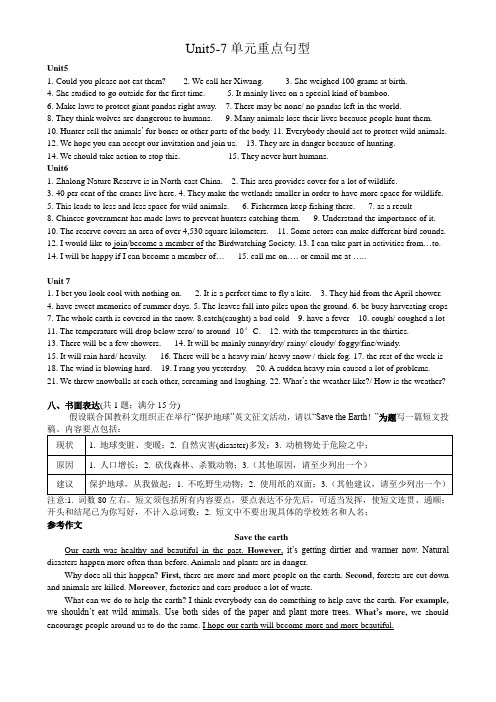
Unit5-7单元重点句型Unit51. Could you please not eat them?2. We call her Xiwang.3. She weighed 100 grams at birth.4. She studied to go outside for the first time.5. It mainly lives on a special kind of bamboo.6. Make laws to protect giant pandas right away.7. There may be none/ no pandas left in the world.8. They think wolves are dangerous to humans. 9. Many animals lose their lives because people hunt them. 10. Hunter sell the animals’ fur bones or other parts of the body. 11. Everybody should act to protect wild animals.12. We hope you can accept our invitation and join us. 13. They are in danger because of hunting.14. We should take action to stop this. 15. They never hurt humans.Unit61. Zhalong Nature Reserve is in North-east China.2. This area provides cover for a lot of wildlife.3. 40 per cent of the cranes live here.4. They make the wetlands smaller in order to have more space for wildlife.5. This leads to less and less space for wild animals.6. Fishermen keep fishing there.7. as a result8. Chinese government has made laws to prevent hunters catching them. 9. Understand the importance of it. 10. The reserve covers an area of over 4,530 square kilometers. 11. Some actors can make different bird sounds.12. I would like to join/become a member of the Birdwatching Society. 13. I can take part in activities from…to.14. I will be happy if I can become a member of…15. call me on…. or email me at …..Unit 71. I bet you look cool with nothing on.2. It is a perfect time to fly a kite.3. They hid from the April shower.4. have sweet memories of summer days.5. The leaves fall into piles upon the ground.6. be busy harvesting crops7. The whole earth is covered in the snow.8.catch(caught) a bad cold9. have a fever 10. cough/ coughed a lot 11. The temperature will drop below zero/ to around -10°C. 12. with the temperatures in the thirties.13. There will be a few showers. 14. It will be mainly sunny/dry/ rainy/ cloudy/ foggy/fine/windy.15. It will rain hard/ heavily. 16. There will be a heavy rain/ heavy snow / thick fog. 17. the rest of the week is 18. The wind is blowing hard. 19. I rang you yesterday. 20. A sudden heavy rain caused a lot of problems. 21. We threw snowballs at each other, screaming and laughing. 22. What’s the weather like?/ How is the weather?八、书面表达(共1题;满分15分)假设联合国教科文组织正在举行“保护地球”英文征文活动,请以“Save the Earth!”为题写一篇短文投稿。
Unit 5 重点单词及句型总结

单词:
uncle
叔叔,姑父
cousin
表兄弟姐妹
husband
丈夫
son
儿子
wife
妻子
than
比
parents
父母
photo
照片
grandparents
祖父母
lovely
可爱的
reunion
聚会
kids
孩子
词组:
anothபைடு நூலகம்r
另一个
thesameyear
-你多久见一次你的表兄弟姐妹?
--每个圣诞节。
每天/每周/每月/每年
每周/每月/每年一次
每周/每月/每年两次
每周/每月/每年三次
总是›通常,向来>经常>有时候>很少>
几乎不>从不
3.-Howoftendoyouseeyourcousins?
-EveryChristmas.
补充」
everyday/week/month/year
onceaweek/month/year
twiceaweek/month/year
threetimesaweek/month/year
always>usually>often>sometimes>seldom>hardlyever>never
/sister/cousin/niece/nephew?
-HeiseighteenyearsolderthanIam.
-HeistwentyyearsyoungerthanIam.
--Sheisfiveyearsolderthanmymotheris.
7年级Unit5-Unit7知识汇总
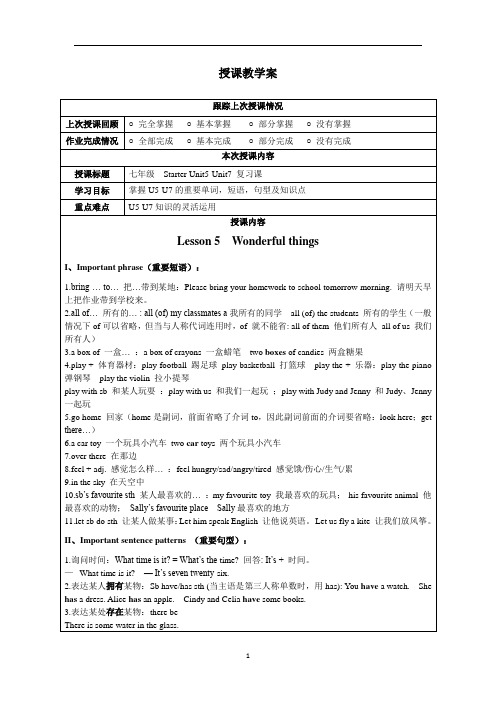
1
There is a horse and two sheep beside the house. There are some cows behind the tree. III、Grammar Points ( 语法点) 一般疑问句:有 be 或情态动词的直接把 be 或情态动词提到句首;无 be 或情态动词的 在句首加 Do/Does(主语是三单时加 Does,加了之后谓语动词还原)。两种情况有第一人称时都要变成第二 人称 1. There is a kite in the sky. (否定、一般疑问句,肯定回答) There is not a kite in the sky. Is there a kite in the sky? —— Yes,there is . 2. My father is a teacher. (变否定句和一般疑问句,并作否定回答) My father is not a teacher. Is your a teacher? —— No, he isn't. 3. My brother likes playing basketball. —Dose your brother like playing basketball? — Yes, he does. 4. 他能在河里游泳。 He can swim in the river. 5. 你的姐姐会说英语吗? 是的,她会。 Can your sister speak English? —— Yes, she can. 6. 我想去科学博物馆。 I want/would like to go to the Science Museum. Do you want to go to the Science Museum?——Yes, I do. Would you like to go to the Science Museum? ——Yes, I'd like to. IV、作文模板(介绍个人物品): 开头,介绍该物品是什么,引出下文: I have many things at home. My favourite one is a/an... . 中间开始从各方面开始详细描述: 1. 外形特征—big、 small、 old、 new...; 颜色—red、 yellow...; ——It is ... ;2.身体部分—eyes、ears、arms...;——It has ... / Its ... is / are... ; 3.能做的事情— jump、 run、swim...;——It can ... 末尾总结,再表达感情:: It looks... (Personality—性格: happy、cute、lovely、friendly... ). I like it very much. 假设你是 Linda,请根据表格中的信息,以 My things 为题,写一篇 60 词左右的短文,介绍自己的 个人物品。 Name schoolbag crayon football umbrella Linda 2, old 3 boxes, new 1 1, blue school computer bike fan watch Leying Middle School / 1, red and black 1, small, new 1, old
Unit5-7知识点(素材)-五年级上册英语

五年级上册第五-第七单元知识点梳理第五单元第一课U5 L11.俱乐部名称词首字母要大写:Table Tennis Club、Football Club2.be good at +名词/动词-ing;擅长......3.would like to do;想要做某事;=want to dowould like to join the Basketball Club句型:1.What club would you like to join?-I’d like to join the Table Tennis Club.2.We have sports clubs in our school.第五单元第二课U5 L21.look的用法:①Look.后面用现在进行时。
②look at... 看...2.现在进行时:be+动词ing.表示正在做...3.Let’s+动原;让我们...4.三单必要”s”5.跑向... run to...句型:现在进行时:表示正在发生的事情,用be+动词ing表示。
句型转换:肯定句:He is playing basketball.否定句:He is not playing basketball.一般疑问句:Is he playing basketball?-Yes,he is./No,he isn’t.特殊疑问句:What is he doing?肯定句:They are playing table tennis.否定句:They are not playing table tennis.一般疑问句:Are they playing table tennis?Yes,they are./No,they aren’t.特殊疑问句:What are they doing?第五单元第三课U5 L31.一班:Class One 二班:Class Two2.It was not easy to do ... ...是不容易的。
七年级英语上册U5重点短语句型

U5. 重点词组句型
1.让我们走/ 让我去拿/让我们问问/ 让他们打排球吧/篮球吧
2.我们迟到了/ 我迟到了/ 他迟到了/ 他们迟到了/ 你迟到了
3.我们的棒球拍在哪里?Bill拿着它。
我弟弟拿着排球。
4.John有足球吗? 不,他没有/ 他有乒乒球拍吗?是的,他有
5.我认为他也有乒乒球。
让我们问问
6.你朋友们有篮球吗?是的,他们有。
他们有两个篮球
7.让我们一起打篮球吧,听起来不错
8.让我们打电脑游戏吧,听起来很有趣。
但是我没有电脑
9.让我们打排球吧,排球很难
10.让我们看电视吧,听起来无趣
11.让我们打篮球吧。
听起来有趣
12.他们有棒球,你没有棒球,他有网球,他没有足球
13.我没有足球但我弟弟有。
我弟弟有一个足球但我没有。
14.我们去同一所学校。
15.我们爱足球。
我们和我们的朋友们在学校起踢足球。
16.我有两个足球,三个排球,四个篮球和五个棒球。
17.我爱运动,但我不做运动,我只在电视上看(运动)。
18.足球困难。
它对我来说容易。
排球对我们来说不容易。
19.篮球对他们来说困难/ 有趣
20.课后,我和同班同学打乒乓球。
21.我弟弟和我在同一所学校/ 同一个班级。
U5-U7知识点

M2 U5 知识点Reading:1.open day 开放日2.plan … for 为….做计划(planned planned)plan to do 计划做某事plan the programme计划活动安排3.arrive at/in sp. 到达某地= reach sp.= get to sp.arrive at 到达具体位置,如学校、电影院、医院、机场、超市等arrive in 到达一个大地方,如国家,城市等。
4.at the entrance 在入口处enter v. 进入5.listen to the school choir 听学校合唱队表演6.look at the noticeboard 看公告板7.finally= at last= in the end 最终final adj.最后8.have a good/great time过得愉快9.library n.图书馆librarian n.图书管理员Listening and speaking:1.want to do sth. 想要做某事2.in different places 在不同的地方3.表示顺序:F irst,…Next,…Then…After that,…Finally…首先,接下去,然后,随后,最后4. 楼层表示法:on the …(序数词)floor 在…层楼英国英语:一楼the ground floor 二楼the first floor 三楼the second floor 美国英语:一楼the first floor 二楼the second floor 三楼the third floor Writing:1.an invitation 一封请柬invite sb. to do sth. 邀请某人做某事2.write an invitation to sb. 写一封请柬给某人3.visit v. 访问visitor n. 游客,访客Reading:1.take photos 拍照(take took taken )M2 U6 知识点Reading:1.travelling time to school 去上学的时间2.far away from sp. 远离某地near+sp. 离某地近的, close to +sp. 靠近某地, next to +sp. 在某地旁边3.It takes sb. some time to do sth. 某人花费某段时间做某事= sb. spend some time doing sth. ( spend spent spent )How long does it take sb. to do sth.?4.go to … by 交通工具= take a/an 交通工具to …e.g. I go to school by ferry.= I take a ferry to school.He goes home on foot.= He walks home.He goes to London by plane.= He flies to London.He goes to school by bicycle. = He rides to school.5. one hour and a half = one and a half hours一个半小时two and a half hours两个半小时two hours and a half 两个半小时(字体加粗部分是固定不变的)6.find out 调查发现7. a few, a little, few, little 区别:1)a few, few 修饰可数名词(后跟名词为复数形式),a little, little修饰不可数名词2)a few, a little=some,表示一些,肯定含义;few, little表示少到几乎没有,否定含义Listening and speaking:1.get to sp. 到达某地get there 到达那里2.half an hour 半小时3.the post office 邮局Reading:1.I see … when I’m on the bus/walking to school 在我在车上/ 步行去学校的路上我看见…when+句子,可用现在进行时,如:I meet my cousin when I am shopping in the supermarket.此句子也可写出When I am shopping in the supermarket, I meet my cousin.(注意区别)2.an advertisement board 一个广告板1.on one’s way to sp. 在某人去…的路上on one’s way home 在某人回家的路上2.talk with sb. about sth. 与某人交谈某事3.department store百货公司4.housing estate 居民区5. police station 警察局6. swimming pool 游泳池7. see sb do sth. 看见某人做某事see sb. doing sth 看见某人正在做某事M2 U7 知识点Reading:1.rules round us 我们周围的规则2.walk on the grass 在草地上散步3.keep quiet 保持安静quietly adv. 安静地4.play basketball 打篮球球类运动不加冠词5.listen to the teachers 听从老师的话6.leave rubbish 丢垃圾7.run across the road 跑步过马路8.wait for 等待9.pick the flowers 摘花10.talk loudly 大声喧哗11.climb the trees 爬树12.turn left 向左转turn right向右转13. must+ do 情态动词,表示“必须”或“肯定”,可用作助动词must not=mustn’t。
知识点整理 初三u5-7
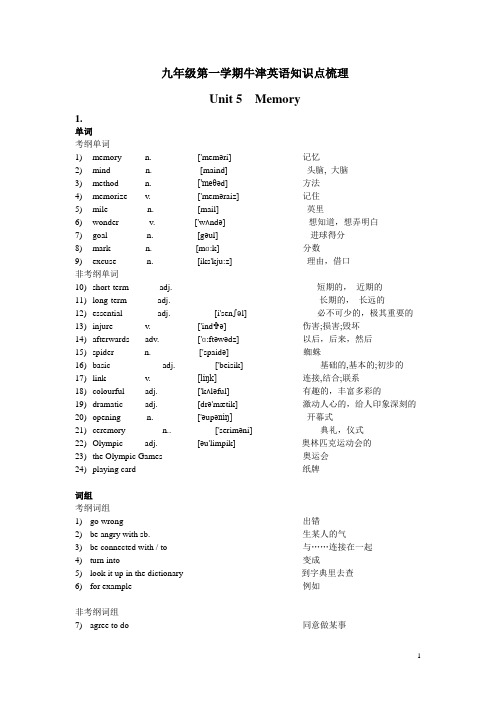
九年级第一学期牛津英语知识点梳理Unit 5 Memory1.单词考纲单词1)memory n. ['meməri] 记忆2)mind n. [maind] 头脑, 大脑3)method n. ['meθəd] 方法4)memorize v. ['meməraiz] 记住5)mile n. [mail] 英里6)wonder v. ['wʌndə] 想知道,想弄明白7)goal n. [gəul] 进球得分8)mark n. [mɑ:k] 分数9)excuse n. [iks'kju:z] 理由,借口非考纲单词10)short-term adj. 短期的,近期的11)long-term adj. 长期的,长远的12)essential adj. [i'senʃəl] 必不可少的,极其重要的13)injure v. ['ind ə] 伤害;损害;毁坏14)afterwards adv. ['ɑ:ftəwədz] 以后,后来,然后15)spider n. ['spaidə] 蜘蛛16)basic adj. ['beisik] 基础的,基本的;初步的17)link v. [liŋk] 连接,结合;联系18)colourful adj. ['kʌləful] 有趣的,丰富多彩的19)dramatic adj. [drə'mætik] 激动人心的,给人印象深刻的20)opening n. ['əupəniŋ]开幕式21)ceremory n.. ['seriməni] 典礼,仪式22)Olympic adj. [əu'limpik] 奥林匹克运动会的23)the Olympic Games 奥运会24)playing card 纸牌词组考纲词组1)go wrong 出错2)be angry with sb. 生某人的气3)be connected with / to 与……连接在一起4)turn into 变成5)look it up in the dictionary 到字典里去查6)for example 例如非考纲词组7)agree to do 同意做某事8)short articles on this topic 关于这个主题的短文9) a short-term memory 短时记忆10)a long-term memory 长期记忆11)get older 变得更老12)become worse 变得更坏13)tell me a joke about memory 告诉我一个有关记忆的玩笑14)lose one‘s memory 失去记忆15)be essential for life 对生命来说是必要的16)a programme on television 一个电视节目17)have an accident 发生一场事故18)injure one‘s brain 伤害某人的大脑19)make a picture in one‘s mind 在头脑中形成图画20)an easy way to do this 一个做到此(事)的简便方法21)link method 联想法22)make it the longest word 使它成为最长的单词23)in the correct order 按正确的顺序24)some amazing stories about memory 一些关于记忆的令人惊奇的故事25)one‘s feelings 某人的感情26)link two things together in an unusual way 用不寻常的方式把两件事情连接起来27)improve your ability 提高你的能力英英解释考纲词汇1)improve v. make something get better; do better2)memory n. ability to remember things3)method n. way of doing something; technique4)go wrong not work properly非考纲词汇5)dramatic adj. exciting; unusual6)imagine v. pretend; make a picture in your mind7)injure v. hurt; damage8)link v. join; connect; make a chain of things or ideas9)essential adj. necessary; very important10)lose one‘s memory be unable to remember things2.重点难点1.重点词汇考纲词汇1)Memory n.记忆力;记忆;回忆memory-improvement course 记忆改善课程a short-term memory 短时记忆a long-term memory 长期记忆lose one‘s memory 失去记忆have a good / poor memory 有好的/ 差的记忆力in my memory 在我的记忆中I had happy memories of my hometown. 我对我家乡有着快乐的回忆。
八年级人教版英语u5知识点

八年级人教版英语u5知识点Unit 5词汇:1. edition n.版本;版次2. achieve v.达到,实现3. concentrate v.集中,全神贯注4. purpose n.目的,意图5. measure v.测量6. furniture n.家具7. block n.街区8. rent n.租金9. slightly adv.轻微地,稍微10. expect v.期望,预期11. culture n.文化12. entire adj.全部的,整个的13. invest v.投资14. feature n.特征,特色15. equal adj.相等的,平等的Unit 5语法:1. 一般过去时态一般过去时态是描述过去发生的事情,叙述的是“过去的事情”。
“一般过去时”无需判断所述事件是完成了还是正在进行(一般将其和过去延续性动作区分),仅仅是强调事情是发生在过去的。
如:I studied Chinese two years ago. (我两年前学过中文。
)He was at home yesterday afternoon. (昨天下午他在家里。
)2. 特殊疑问句特殊疑问句是指以特殊疑问词开头,句子以问号结尾的句子。
其特点是:疑问词起到具体化和限制的作用,一般具有7个基本疑问词:who (谁), what (什么), when (什么时候), where (哪里), why (为什么), how (怎么), how many (多少) 。
如:What book did you buy? (你买了什么书?)Where did you go last weekend? (上个周末你去哪里了?)Who is your best friend? (你最好的朋友是谁?)3. 现在完成时态现在完成时态采用“have / has + 过去分词”的结构。
现在完成时反映目前的状态的来源是过去发生的事情。
七年级上册英语unit5知识点总结归纳
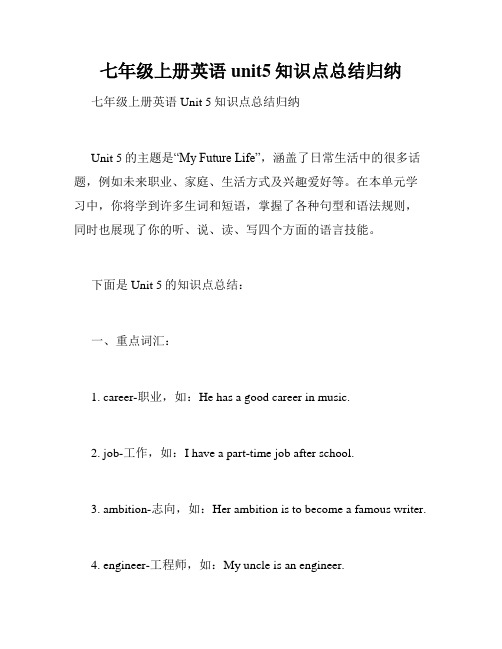
七年级上册英语unit5知识点总结归纳七年级上册英语Unit 5知识点总结归纳Unit 5的主题是“My Future Life”,涵盖了日常生活中的很多话题,例如未来职业、家庭、生活方式及兴趣爱好等。
在本单元学习中,你将学到许多生词和短语,掌握了各种句型和语法规则,同时也展现了你的听、说、读、写四个方面的语言技能。
下面是Unit 5的知识点总结:一、重点词汇:1. career-职业,如:He has a good career in music.2. job-工作,如:I have a part-time job after school.3. ambition-志向,如:Her ambition is to become a famous writer.4. engineer-工程师,如:My uncle is an engineer.5. accountant-会计师,如:She wants to be an accountant when she grows up.6. lawyer-律师,如:John's dad is a lawyer.7. artist-艺术家,如:She is a famous artist in our town.8. musician-音乐家,如:He is a famous musician in our country.9. architect-建筑师,如:My cousin is studying to become an architect.10. scientist-科学家,如:Albert Einstein was a great scientist.二、重点短语:1. in the future-在未来,如:What do you want to be in the future?2. be interested in-对…感兴趣,如:She is interested in science.3. do research-进行研究,如:They are doing research on new medicine.4. make a decision-做出决定,如:You need to make a decision about your future.5. graduate from-毕业于,如:She wants to graduate from a famous university.6. get a degree-获得学位,如:He hopes to get a degree in business.7. dream of-梦想成为,如:She dreams of becoming an actress.8. take a course-参加课程,如:He is taking a math course this semester.9. attend a college-上大学,如:She wants to attend a college in California.10. apply for-申请,如:He is applying for a job in New York.三、重点句型:1. What do you want to be in the future?(你将来想成为什么?)这是问别人职业志向的常见句型。
Unit 5 重点句型
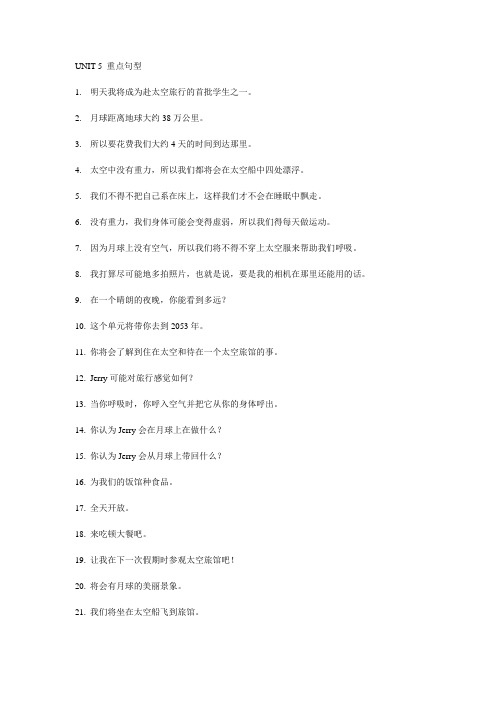
UNIT 5 重点句型1.明天我将成为赴太空旅行的首批学生之一。
2.月球距离地球大约38万公里。
3.所以要花费我们大约4天的时间到达那里。
4.太空中没有重力,所以我们都将会在太空船中四处漂浮。
5.我们不得不把自己系在床上,这样我们才不会在睡眠中飘走。
6.没有重力,我们身体可能会变得虚弱,所以我们得每天做运动。
7.因为月球上没有空气,所以我们将不得不穿上太空服来帮助我们呼吸。
8.我打算尽可能地多拍照片,也就是说,要是我的相机在那里还能用的话。
9.在一个晴朗的夜晚,你能看到多远?10.这个单元将带你去到2053年。
11.你将会了解到住在太空和待在一个太空旅馆的事。
12.Jerry可能对旅行感觉如何?13.当你呼吸时,你呼入空气并把它从你的身体呼出。
14.你认为Jerry会在月球上在做什么?15.你认为Jerry会从月球上带回什么?16.为我们的饭馆种食品。
17.全天开放。
18.来吃顿大餐吧。
19.让我在下一次假期时参观太空旅馆吧!20.将会有月球的美丽景象。
21.我们将坐在太空船飞到旅馆。
22.Alice打算每天到这来喂他们吗?23.在你左边的警察正在听一个长头发的高个女人说话。
24.计划你在太空旅馆的第一天。
25.你想在月球上的旅馆里度假吗?26.目前,月球上没有旅馆。
27.如果我们能够解决一些问题,我们将来就可以在那建旅馆。
28.他们还需要大量的空气,以便那里的人们可以呼吸。
29.月球上的旅馆会有带大窗户的房间,以便你可以看到地球。
30.你可以在旅馆游泳池里畅游,并能看到你周围的所有星星。
31.去月球的旅行是要花费许多钱的。
32.数千年前,中国有个关于“嫦娥奔月”的故事。
33.在明朝,中国人制造了第一艘火箭。
34.在1970年4月24日,中国向太空发射了第一艘人造卫星。
35.在2003.10.15神州五号太空飞船载着杨利伟飞向了太空。
36.想要做某事。
(3种)37.等不及做某事There’s no gravity in space.Without sth.38.帮某人做某事(2种)39.忙于做某事40.这个机器不运转了(4种)41.我的妹妹太小了,不能开车。
七下u5-u7词句的摘抄

初中英语知识点总结(八下U5-U7)一.pick up的用法1.意为捡起,例句:There is a pen on the floor.Please pick it up.2.意为驾车去接某人,例句:Please wait at the school gate.I will pick up the phone.3.意为接电话,例句:I called you last night,but you didn’t pick up my phone二.与remind有关的短语remind sb of+sth/从句提醒某人做某事remind sb to do sth提醒某人做某事三.与leave有关的短语leave sb to do sth留下/让某人做某事leave sb doing sth让某人一直做某事leave+宾语+形容词让...处于某种状态四.与marry有关的短语marry sb和某人结婚marry sb to sb把某人嫁给某人或为某人娶某人五.get married与be married的辨析两者都可以和介词to连用,但不能和with连用get married:意为结婚,表示动作,不能与表示一段时间的时间状语连用be married:意为结婚,表示状态,能与表示一段时间的时间状语连词连用六.population的用法1.做主语时,表示人口数,谓语动词用单数形式2.做主语且被分数或百分数修饰时,谓语动词要用复数形式3.表示人口多少,不用much/many或few/little,而要用large/big/small4.询问人口数量时用what/how lauge,不用how many/much七.比较级+that+any other的用法本句是比较级+that+any other+单数名词结构,表示最高级意义例句:He runs faster than any other student in his class。
- 1、下载文档前请自行甄别文档内容的完整性,平台不提供额外的编辑、内容补充、找答案等附加服务。
- 2、"仅部分预览"的文档,不可在线预览部分如存在完整性等问题,可反馈申请退款(可完整预览的文档不适用该条件!)。
- 3、如文档侵犯您的权益,请联系客服反馈,我们会尽快为您处理(人工客服工作时间:9:00-18:30)。
Unit 5: It’s a magic hat.
重点单词:
1.forty四十
2.fifty五十
3.sixty六十
4.seventy七十
5.eighty八十
6.ninety九十
7.a hundred一百
8.cheap便宜
9.expensive昂贵 10.dollar美元 11.five hundred五百12.a thousand一千 13.yuan元 14.magic魔术 15.try试一下
Sounds and words:
1.c olor颜色
2.c arrot胡萝卜
3.c ups茶杯
4.c ookies小甜饼
5.k ite风筝
6.k eys钥匙
重点句子:(Target)
1.How much is the guitar? 吉他多少钱? It’s $85.它是八十五美元。
2.Wow! That’s expensive.哇!那是昂贵的。
3.How much are those socks? 那些袜子多少钱? They’re$1.它们一美元。
4.Hey! That’s cheap. 嘿!那是便宜的。
5.How much is the hat? 那顶帽子多少钱?It’s a hundred dollars.它一百美元。
难点句子:(Conversation):
1.What’s that? 那是什么?
It’s a hat.它是一顶帽子。
It’s a magic hat.它是一顶魔术帽子。
2.Hey. I can do magic.嘿,我会玩魔术。
3.Can I try it? 我可以试一下吗? Sure/Of course.当然可以。
Unit 6: The turtle is faster.
重点单词:
1.hippo河马
2.elephant大象
3.turtle乌龟
4.snail蜗牛
5.big大的
6.big ger更大的
7.small小的
8.small er更小的
9.fast快的 10.fast er更快的 11.slow慢的 12.slow er更慢的14.or或者 15.win赢,获胜 16.favorite最喜欢的人或物17.all所有的
Sounds and words:
1.g ive给
2.ge t得到
3.g ood好的
4.g ift礼物
5.g ate门口
6.g arage车库
重点句子:(Target)
1.Is a hippo big? 河马大吗? Oh, yes, it’s big.哦,是的,它大。
2.Is an elephant big? 大象大吗? Yes, it’s very big.是的,它很大。
3.Which is bigger, an elephant or a hippo? 大象和河马哪一个更大些?An elephant is bigger.大象更大些。
4.Which is slower, a turtle or a snail? 乌龟还是蜗牛哪一个更慢些?
A snail is slower.蜗牛更慢些。
5.I’m fast.我快。
I’m faster.我更快。
6.You’re not fast.你不快。
7.You’re slow.你慢。
You’re slower.你更慢些。
难点句子:(Conversation):
1.Let’s run to that tree.让我们跑到那棵树。
2.He’s fast but I’ll be faster.他快但我将更快。
3.He ate all my cookies.他吃了我所有的小甜饼。
Unit 7: He’s better than us.
重点单词:
1.old年纪大长的
2.old er年纪更大
3.young年轻的
4.younger年纪更轻的
5.tall高的
6.tall er更高的
7.short矮的,短的
8.short er更矮的,更短的
9.cheap便宜10.cheap er更便宜的 11.more更 12.expensive昂贵13.more expensive更昂贵的 14.good好的 15.better更好的16.bad坏的,糟糕的 17.worse更坏的,更糟糕的 18.than比19.picture图画,画 我们 21.hold拿住,握住,抓紧22.look after照顾,照料
Sounds and words:
1.ele ph ant大象
2.cou gh咳嗽
3.hal f一半
4.cal f小牛
5.kni fe小刀
6.wi fe妻子
重点句子:(Target)
1.These noodles are cheaper than those noodles.
这些面条比那些面条更便宜。
2.Yes, but those noodles are better than these noodles.
是的,但那些面条比这些面条更好。
3.I ’m older than you and taller than you.我比你年纪更大,比你更高。
4.So I ’m better than you.所以我比你更好。
5.He ’s older, taller and better than us.
他比我们年纪更大,更高和更好。
难点句子:(Conversation ):
1.Hi kids. What ’s that? 小孩子们,那是什么?
2.Be careful.小心。
3.It ’s a very expensive picture.它是一幅非常昂贵的图画。
4.It ’s more expensive than all your toys, Gogo.
Gogo ,它比你所有的玩具更昂贵。
5.Let me hold it, Tony.汤尼,让我拿住它。
6.I ’ll look after it.我将照顾它。
7.What a mess! 多凌乱啊!
8.Who ’s going to clean the room? 谁将打扫房间?
Tony ’ll do it.汤尼将做。
形容词的比较级规则变化
形容词的比较级不规则变化
many / much →more →most; good / well → better → best ;
bad / ill →worse →worst ; far →farther / further →furthest ; little →less →least 构成
原级 比较级 ①一般在词尾加-er
small smaller ②以字母e 结尾的词,只加-r nice nicer
③以一个辅音字母结尾的重读闭音节,双写这一辅音字母后,
再加-er
big
bigger ④以“辅音字母+y”结尾的词,
改y 为i ,再加-er
happy happier ⑤其他双音节词和多音节词,
在词前加 more
difficult more difficult ⑥分词(-ing ,-ed )比较级一般
在词前加 more
interesting, (有趣的) tired(累的)
more interesting more tired。
